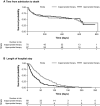Epidemiology, Outcomes and Resource Utilisation in Patients with Carbapenem Non-susceptible Gram-Negative Bacteria in the UK: A Retrospective, Observational Study (CARBAR UK)
- PMID: 35701725
- PMCID: PMC9309132
- DOI: 10.1007/s12325-022-02177-3
Epidemiology, Outcomes and Resource Utilisation in Patients with Carbapenem Non-susceptible Gram-Negative Bacteria in the UK: A Retrospective, Observational Study (CARBAR UK)
Abstract
Introduction: Antimicrobial resistance is an urgent medical challenge. In this two-part study, we investigated the epidemiology and management of carbapenem non-susceptible (Carb-NS) Gram-negative bacteria (GNB) in the UK.
Methods: We conducted a retrospective review of data from UK hospitals (ten in part 1, nine in part 2). In part 1, epidemiological data were collected from patients hospitalised between April 2017 and March 2018 with any laboratory detection of Carb-NS GNB, encompassing both colonisation and infection. In part 2, diagnosis and management pathways in a randomly selected population of adults from part 1 with confirmed Carb-NS GNB infection were assessed. Data were obtained from a detailed medical chart review for ≥ 3 months from index (collection date of first positive Carb-NS GNB sample).
Results: Of 42,340 GNB isolates from 36,098 patients colonised/infected with GNB in part 1, 7% were Carb-NS. In 157 patients included in part 2, 234 GNB index samples were collected, of which 197 (82%) were Carb-NS (median number of Carb-NS pathogens per patient, 1; range 1-3). The most frequent Carb-NS isolates were Pseudomonas aeruginosa (36%), Stenotrophomonas maltophilia (29%) and Klebsiella pneumoniae (10%). Median length of hospitalisation was 34 days. Median time from index to appropriate therapy was 3 days, with empirical therapy initiated a median of 1 day before index. Carb-NS infection was believed to contribute to 21 (28%) of 76 deaths during the study.
Conclusions: This study highlights the high incidence of Carb-NS GNB colonisation and infection in the UK and the need for improved management of patients with Carb-NS GNB infection.
Keywords: Bacterial resistance; Carbapenem-resistant; Enterobacterales; Epidemiology; Extensive drug resistance; Gram-negative bacteria.
© 2022. The Author(s).
Figures


References
-
- World Health Organization (WHO).WHO publishes list of bacteria for which new antibiotics are urgently needed. 2017. https://www.who.int/news/item/27-02-2017-who-publishes-list-of-bacteria-.... Accessed 1 July 2020.
Publication types
MeSH terms
Substances
LinkOut - more resources
Full Text Sources
Miscellaneous

